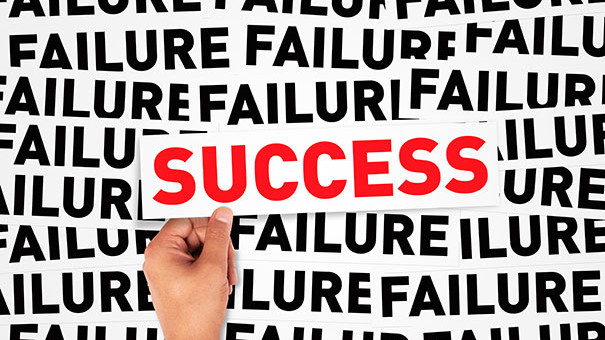
Playing it safe is a path towards ‘me too’ products and irrelevancy.
When a company grows, it can often become more reluctant to risk and failure. Mature companies are almost eager for tried-and-true techniques to implement. Fast-growth companies should be striving to learn from (and not repeat) failures rather than “not to fail.”
A company that fosters a culture believing it is okay to fail immediately has a distinct competitive advantage. This is because we can learn so much more from our failures than we do from our successes. When succeeding, we frequently apply 20-20 hindsight to justify our decisions and reasons for our success. There’s a saying that goes, “Success has many parents, but failure is an orphan.” That means many people may jump at the chance to take credit for success, but very few will accept responsibility for failure when it happens. That group-think dynamic is what holds many companies back.
Dr. Astro Teller currently manages Google[x], which he describes as “Google’s moonshot factory for building magical, audacious ideas that through science and technology can be brought to reality.” In his Wired article he explains that:
It’s often easier to make something 10 times better than it is to make it 10 percent better.
Yes … really.
Because when you’re working to make things 10 percent better, you inevitably focus on the existing tools and assumptions, and on building on top of an existing solution that many people have already spent a lot of time thinking about. Such incremental progress is driven by extra effort, extra money, and extra resources. It’s tempting to feel improving things this way means we’re being good soldiers, with the grit and perseverance to continue where others may have failed–but most of the time we find ourselves stuck in the same old slog.
I’ve never been a fan of “fast follower” companies, but the concept that it’s easier to make something 10 times better than 10 percent better seemed counterintuitive. The 10 times efforts are about essentially changing the world–space travel, self-driving cars, wearable technology, and all the remarkable ideas that win our hearts and minds. To accomplish these massive leaps forward, we have to be willing to fail and also “own” failure so that we can learn from it.
Instead of paying lip service to creativity, innovation, and practical change, true leaders must be able to own their failures, lead by example, and be brave enough to fail publicly. In his bestselling book, Good to Great, Jim Collins noted that leaders of successful companies tended to “look in the mirror” when handling problems (or failure) while “looking through the window” to give credit for success. By doing this, leaders of great companies were the first to take accountability for failures, rather than waste time looking for someone to blame. Likewise, these companies were also swift to point out others who were driving the success of their company.
If you want to guarantee long-term growth and sustainability for your company, you need to adopt a culture of calculated risk. Playing it safe is a path toward “me too” products and irrelevancy. The best option is to fail your way to the top. When you embrace the insights and key lessons that come with failure, you open new doors and new possibilities. You will only discover your true path by blazing your own trail and learning from your own unique failures. That path will lead to sustainable growth.
